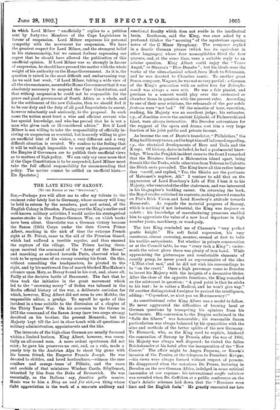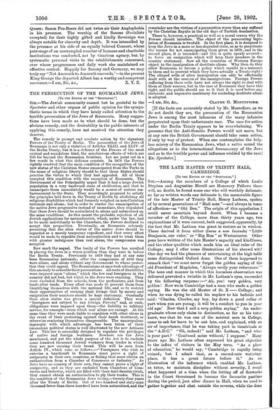THE LATE KING OF SAXONY. [To THE EDITOR Or THE
" SPECTATOR.".1
Srn,—Perhaps you will allow me to offer my tribute to the eminent ruler lately lost to Germany, whose memory will long be held in esteem by the members, past and actual, of the English Colony in Dresden. Passing over the King's earlier and well-known military activities, I would notice his strategetical master-stroke in the Franco-German War, on which books hare been silent. Gravelotte was a German victory because the Saxon (12th) Corps under the then Crown Prince Albert, reaching in the nick of time the extreme French right at St. Privat, came to the aid of the Prussian Guard, which had suffered a terrible repulse, and thus ensured the capture of the village. The Prince having there- upon received the command of the "Army of the Meuse," and marching as ordered towards Paris, observed what he took to be symptoms of an enemy crossing his front. On this, without consulting the headquarters, he pivoted to the right, and by his northward line of march blocked MacMahon's advance upon Metz, as Donay found to his cost, and, above all, Failly at the decisive battle of Beaumont. The fact that he thus took the initiative in the great movement which led to the "crowning mercy" of Sedan was tabooed in the Berlin official history of the war, a deliberate omission for which, however, King Albert did not seem to owe Moltke, the responsible editor, a grudge. To myself he spoke of this incident in a tone suitable to the discussion of a chapter of the Thirty Years' War. On his accession to the throne in 1873 the command of the Saxon Army (now two corps strong) devolved on his brother, the present Monarch; but his Majesty kept till the last in close touch with all questions of military administration, appointments and the like.
The interests of the high-class German are usually focussed within a limited horizon. King Albert, however, was essen- tially an all-round man. A more ardent sportsman did not exist; he gave his preserves no rest, and, as a rule, made a yearly trip to the Austrian Alps to shoot big game with his bosom friend, the Emperor Francis Joseph. He was devoted to skittles, and loved horticulture,—witness the rare conifers and orange-trees `of Pillnitz, and the roses and orchids of that miniature Windsor Castle, Sibyllenort, inherited by him from the Duke of Brunswick. He was essentially, as the Italians ' say, fanatico pella musica. Music was to him a Ding an and far sick,—a thing whose right appreciation is the work of a separate auditory and emotional faculty which does not reside in the intellectual brain. Beethoven, said the King, was once asked by a profound thinker the " meaning" of the mysterious opening notes of the C Minor Symphony. The composer replied in a drastic German phrase (which has its equivalent in other languages) whose four monosyllables fitted the four quavers, and, at the same time, were a suitable reply to an asinine question. King Albert could enjoy the " Veuve Angot," or Strauss's " Blue Danube" ; but his ideals were the works of the ultra-classical school, from Bach to Schumann, and he was devoted to Chamber music. To another great Saxon composer, Wagner, he was not so very partial : a German of the King's generation with an active love for Zukunfts- musik was always a rara axis. He was a fair pianist, and previous to a concert would play over the orchestral or chamber items in question with the present ruler. According to one of their near relations, the rehearsals of the par nobile fratrum were "not bad." Of the minutia) of tone, execution, reading, his Majesty was an excellent judge; his estimates, e.g., of Joachim versus the ancient Lipinski, of Paderewski and Liszt, were always instructive. His Dresden subventions for the support of the opera and drama cost him a very large fraction of his joint public and private income.
As became the son of Dante's translator, " Philalethes," the King had literary tastes, and he kept himself informed regarding, e.g., the electrical developments of Herz and Tesla and the X rays. Of history, dates included, he had a professorial lmow- ledge. When the Penjdeh incident came to the front I remarked that the Heratees formed a Mahometan island apart, being Sunnis like the Turks, while otherwise from Teheran to Calcutta the Shiah sects prevailed. The King knew all this rather better that ”Isself, and replied, "Yes, the Shiahs are the partisans of Mahomet's nephew, Ali." I venture' to add that on the appearance of Lord Rosebery's Life of Pitt I lent it to his Majesty, who venerated the elder statesman, and was interested in his biographer's budding career. On returning the book, the Royal reader criticised its contents, making shrewd remarks on Pitt's Irish Union and Lord Rosebery's attitude towards Home-rule. As regards the material progress of Saxony, which is nothing if not industrial, the King was toujours en vedette : his knowledge of manufacturing processes enabled him to appreciate the value of a new local departure in high number yarns, machinery, or wood-pulp.
The late King reminded me of Chaucer's " very perfect gentle knight." His soft facial expression, his very courteous, almost caressing, manner, seemed at first to belie his warlike antecedents. Yet whether in private conversation or at the Council table, he was "every inch a King": under- neath the velvet glove there was plenty of iron hand. While appreciating the picturesque and comfortable elements of courtly pomp, he never posed as representative of the idea "L'Etat c'est moi," and he did not wish his surroundings to be " on the crawL" Once a high personage came to Dresden to invest his Majesty with the insignia of a decorative Order. After the close of the apposite functions, the King remarked on the aristocrat in question : " A good point is that he sticks to his text : he is rather a Radical, and he won't give way." Of another distinguished foreigner he praised the intelligence, adding : " Cependant, ce n'est pas un' Montmorency !"
As constitutional ruler King Albert was a model to follow. He never aggravated the difficulties of burning local or German questions by trumpeting his opinions from his battlements. His conversion to the Empire acclaimed in the "Salle des Glares" was honourable ; his reasonable Saxon particularism was always balanced by his sympathies with the aims and methods of the better spirits of the new Germany. To Bismarck, who, as the King used to explain, hindered the annexation of Saxony by Prussia after the war of 1866, his Majesty was always well disposed: he visited the fallen Reichskanzler at his hotel after the inauguration of the "New Course." The affair might be Angra Pequena, or Russia's invasion of the Pamirs, or the telegram to President Krieger, —his views were always formed without respect of persons. He disapproved when the notorious Dr. Peters, lecturing in Dresden on the new German Africa, indulged in some satirical innuendos at our expense : his international souffle intgrieur was revealed when Dr. Geffcken at a public conference on the Czar's Asiatic schemes laid down that the " Russians were liars and the English fools." He greatly venerated our late
Queen: Saxon Pro-Boers did not twice air their Anglophobia in his presence. The worship of the Saxons (Socialists excepted) for their highly gifted and kindly Sovereign was always notable for sincerity and depth, It was intensified by the presence at his side of an equally beloved Consort, whose patronage of an unexampled number of humane and charitable institutions was conducted, not by vicarious agency, but. by systematic personal visits to the establishments concerned, over whose programmes and daily work she maintained an effective control. Happily for Saxony and Germany, we may truly say "Not Amurath to Amurath succeeds,"—in the present King George the departed Albert has a worthy and competent



















































 Previous page
Previous page